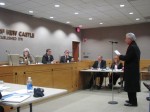Chappaqua Affordable Housing Proposal May Need to Be Smaller

The New Castle Town Board expressed deep reservations Tuesday night about the density and parking of the affordable housing project proposed for downtown Chappaqua, leading to suggestions that the building may need to be downsized.
At the continuation of the public hearing at town hall for Conifer Realty’s Chappaqua Station, skeptical comments from the board and several speakers focused mainly on how the 36-unit apartment building on just over one-third of an acre on Hunts Place may not leave enough room for adequate parking. There were also continued fears that the structure would be out of character with the surrounding area.
Supervisor Susan Carpenter suggested to Conifer representatives that a smaller building may have to be considered.
“I think that’s something you should look at,” Carpenter said.
Current zoning requires that Conifer provide 51 on-site spaces; however, under the submitted plans the Rochester-based developer has proposed 40 spaces on the property and the use of 12 spaces in the town’s nearby commuter lot for overflow parking.
Parking and mass of the building, along with several other concerns such as pedestrians using the Route 120 bridge and how the fire department would fight a blaze, should at least trigger a formal review under the state Environmental Quality Review Act (SEQR), said Councilman Robin Stout.
“From my point of view, I think that there are several potential areas where there would be a significant impact, and again, from my personal point of view, I think the current project, of course, at this time would be subject to a positive declaration, which would require an environmental impact statement,” Stout said.
Attorney Alfred DelBello, representing Conifer Realty, said the special permit that the applicant is seeking gives officials the latitude to reduce on-site parking or to consider an off-site alternative.
Also, the use of the overflow parking would be limited to overnight hours when there would be little to no impact on the community.
“At this time there’s a substantial excess of parking,” said Richard Pearson, a senior associate at John Meyer Consulting, an engineering firm retained by Conifer Realty. “We would not be taking away parking from merchants or other customers of the downtown stores.”
However, Stout and Councilman Jason Chapin said on their review of the applicant’s responses to public comments from the Dec. 11 portion of the hearing, Conifer has failed to meet at least two of the five criteria that must be satisfied to obtain the special permit.
Of the four speakers at Tuesday’s hearing, all were critical of some aspect of the proposal. Resident Ellen Schlossberg worried that the proposed parking arrangement would have a negative impact on the downtown.
“What are you going to do to make sure that we as residents still have access to our parking?” Schlossberg asked the town board.
Chappaqua resident Steven Levine said town officials would be “insane” if they approve the current proposal. He called on the developer’s representatives to live at the site for three years and have to put up with the likelihood of noise and the smell of diesel from the nearby Saw Mill Parkway and Metro-North commuter trains.
He also said the building is too big for the site.
“I think this project, while I’m for affordable housing, okay, is way out of proportion to the plot that it’s on, and that if they scale down to maybe two stories it might be more appropriate,” Levine said.
Addressing the possibility that the Route 120 bridge could attract too much pedestrian traffic from residents heading to the train station and downtown, Carpenter asked the developer to consider an alternate walking path.
But DelBello said that would negate the appeal of the project and jeopardize one of the requirements under the county’s affordable housing settlement.
“We’d be happy to talk to the (state) DOT about putting something up to prevent people from dropping off or crossing the street,” DelBello said. “But not to have access to the bridge means it’s no longer a transit-oriented development.”
The lawyer appealed to the board to close the public hearing and move toward making an environmental determination under SEQR so the application could move along.
However, citing incomplete responses from last month’s session and uneasiness regarding the issues discussed on Tuesday night, the board agreed to adjourn the hearing until Feb. 12.

Martin has more than 30 years experience covering local news in Westchester and Putnam counties, including a frequent focus on zoning and planning issues. He has been editor-in-chief of The Examiner since its inception in 2007. Read more from Martin’s editor-author bio here. Read Martin’s archived work here: https://www.theexaminernews.com/author/martin-wilbur2007/
